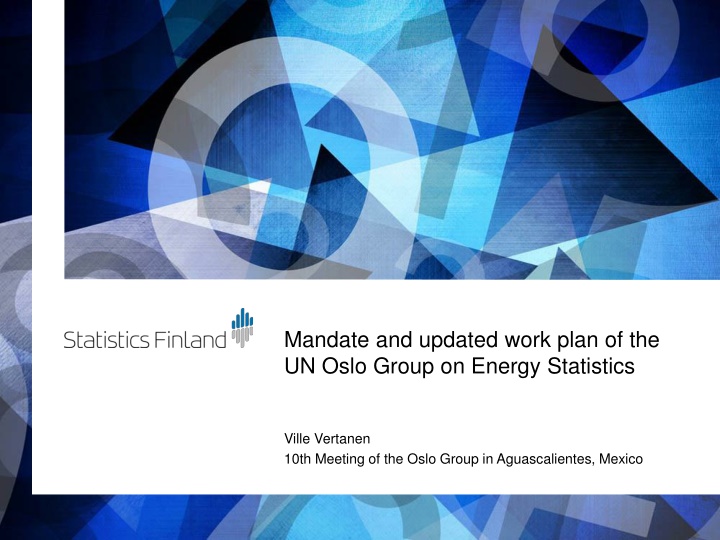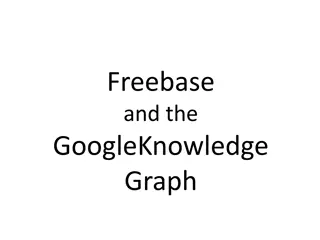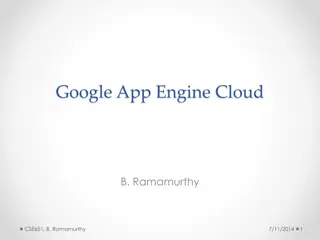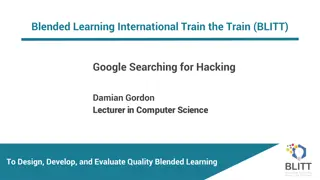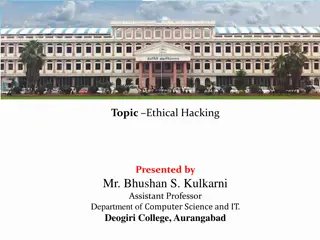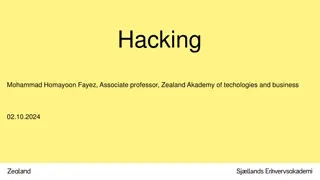Google Hacking Techniques Overview
The Google search engine offers various features including language translation, web searches, advanced operators, and more. These features can be utilized for unauthorized access by malicious users. Understanding Google's search techniques is crucial for both basic and advanced search operations.
Uploaded on Mar 22, 2025 | 1 Views
Download Presentation

Please find below an Image/Link to download the presentation.
The content on the website is provided AS IS for your information and personal use only. It may not be sold, licensed, or shared on other websites without obtaining consent from the author.If you encounter any issues during the download, it is possible that the publisher has removed the file from their server.
You are allowed to download the files provided on this website for personal or commercial use, subject to the condition that they are used lawfully. All files are the property of their respective owners.
The content on the website is provided AS IS for your information and personal use only. It may not be sold, licensed, or shared on other websites without obtaining consent from the author.
E N D
Presentation Transcript
Mandate and updated work plan of the UN Oslo Group on Energy Statistics Ville Vertanen 10th Meeting of the Oslo Group in Aguascalientes, Mexico
Background The United Nations Statistical Commission, at its 36th session in March 2005, approved the establishment of two complementary working groups to carry out the revision and further development of relevant international standards on energy statistics: The Oslo group on energy statistics, and the Intersecretariat Working Group on Energy Statistics. Oslo Groups purpose is to establish a forum for countries at the international level contribute to improved international standards and improved methods for official energy statistics by pooling expertise in the energy community Today we are holding our 10th meeting at Aguascalientes. Previous meetings have been at Oslo, Delhi, Vienna, Ottawa, Cork, Canberra, Helsinki, Baku and Abu Dhabi. 2 10 May 2016 Ville Vertanen
Membership The Oslo group on energy statistics consists of representatives from more than 30 countries plus several international agencies. In addition, several groups and institutions collaborate with the Oslo group in the development of international standards on energy statistics. List of Members of the Oslo Group 3 10 May 2016 Ville Vertanen
Mandate Address issues related to energy statistics In particular, its mandate includes the following actions: Identify users' needs Define scope of official energy statistics Identify and collect national and international good practices Review and contribute to the updating of UNSD handbooks and manuals on energy statistics Identify gaps in coverage (e.g. fuel types, flows) and to develop methodology to cover gaps Adopt link or develop bridges to international standard concepts and classifications in economic/environment statistics to facilitate the integration and interface of energy statistics with other statistical systems Recommend a core set of tables as minimum requirement at national and international level to satisfy major user needs 4 10 May 2016 Ville Vertanen
Main outputs The main output of the Oslo group to date has been the development of the International Recommendations for Energy Statistics (IRES). The IRES was adopted by the United Nations Statistical Commission at its forty-second session in February 2011. In 2013 the group completed the Energy Statistics Compilers Manual (ESCM). The final version of the ESCM is expected to be ready after 10thOG meeting As part of the preparation of the ESCM, a country practice template was developed by the Oslo Group in cooperation with UNSD. Country Practices, Presentations and Papers http://unstats.un.org/oslogroup/meetings/ 5 10 May 2016 Ville Vertanen
Work Plan With the work of ESCM complete, the OG identified issues and challenges to further promote and support energy statistics The use of administrative data sources for data collection and/or validation Electronic data collection systems and SDMX for energy statistics Energy data dissemination practices Quality reviews of energy data Energy Indicators (not active at this meeting) Energy prices (not active at this meeting) The activities, work plans and progress of active working groups will be discussed later in this meeting 6 10 May 2016 Ville Vertanen
For discussion Is this the way to go towards our next meeting? Are there some other emerging interests? We will learn more about these groups during their sessions 7 10 May 2016 Ville Vertanen
